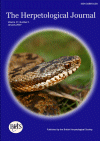
HERPETOLOGICAL JOURNAL
Scope & Guideline
Advancing herpetological knowledge for a sustainable future.
Introduction
Aims and Scopes
- Ecological and Behavioral Studies:
The journal publishes research that investigates the ecological roles and behaviors of reptiles and amphibians in various habitats, focusing on their interactions with the environment and other species. - Conservation Biology:
A significant emphasis is placed on conservation efforts for endangered and endemic species, including studies on population dynamics, habitat suitability, and the impacts of human activities. - Morphological and Phylogenetic Research:
The journal features studies on the morphology and phylogenetics of herpetofauna, contributing to taxonomy and evolutionary understanding within the group. - Impact of Environmental Change:
Research addressing the effects of climate change, habitat alteration, and pollution on herpetological species is a core focus, highlighting the vulnerability of these organisms. - Innovative Research Techniques:
The journal encourages the use of innovative methodologies, such as eDNA analysis and acoustic monitoring, to enhance data collection and analysis in herpetological studies.
Trending and Emerging
- Climate Change Impact Studies:
There is a growing emphasis on understanding how climate change affects the distribution and survival of herpetological species, with studies focusing on specific case examples and broader ecological implications. - Urban Ecology and Anthropogenic Effects:
Research exploring the impacts of urbanization and habitat modification on herpetofauna is trending, as scientists seek to understand how species adapt to or are affected by human-altered environments. - Innovative Monitoring Techniques:
The use of advanced monitoring techniques, such as eDNA and acoustic monitoring, is on the rise, reflecting a trend towards more efficient and less invasive methods of studying herpetological populations. - Conservation Genetics:
Emerging studies are increasingly focusing on the genetic diversity and conservation genetics of herpetological species, linking genetic health to conservation strategies. - Behavioral Plasticity and Adaptation:
Research examining behavioral plasticity in response to environmental changes, such as predation pressure and habitat modification, is gaining prominence, highlighting the adaptability of herpetofauna.
Declining or Waning
- Traditional Taxonomic Studies:
While taxonomy remains important, there has been a noticeable decline in traditional descriptive taxonomic studies, possibly due to the increasing integration of molecular techniques and a focus on ecological and conservation-related research. - Generalized Habitat Studies:
Research focusing solely on general habitat descriptions without specific ecological or conservation implications is becoming less common, as studies increasingly seek to link habitat data with ecological outcomes. - Historical Ecology without Modern Context:
Historical ecological studies that do not incorporate modern conservation frameworks or current environmental challenges are receiving less attention, reflecting a shift towards more applied research.
Similar Journals

Acta Herpetologica
Bridging Gaps in Herpetological ScienceActa Herpetologica, published by FIRENZE UNIV PRESS, is a reputable Open Access journal dedicated to the field of herpetology, encompassing research on amphibians and reptiles. Established with the aim to foster scientific discourse, this journal has made its content freely accessible since 2006, enabling researchers, professionals, and students to engage with a diverse array of studies and findings. As of 2023, the journal is categorized in Q3 of Animal Science and Zoology and ranks 357 out of 490 in the Scopus database, reflecting its contribution to the field and providing a platform for high-quality research. The journal showcases manuscripts that cover a wide range of topics, from ecology and conservation to physiology and evolution, supporting global efforts to understand and preserve herpetofauna. With a convergence period spanning from 2009 to 2024, Acta Herpetologica continues to be an essential resource for advancing academic knowledge and facilitating discussions in herpetological research.
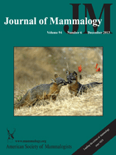
JOURNAL OF MAMMALOGY
Connecting Scholars for a Sustainable Future in MammalogyJournal of Mammalogy, published by Oxford University Press Inc, is a premier journal dedicated to the field of mammalogy, providing a key platform for researchers and professionals interested in the biology, ecology, and conservation of mammals. With a prestigious impact factor reflected in its Q1 ranking in Animal Science and Zoology, and multiple Q2 rankings in related categories such as Ecology and Genetics for 2023, this journal is recognized for its significant contribution to advancing knowledge in the discipline. The journal features rigorous peer-reviewed articles, ensuring high-quality research output valuable for students, academia, and conservation efforts alike. While not an open-access journal, it offers comprehensive subscription options for institutions and individual readers, promoting accessibility to critical findings in the realm of mammal research. Established in the earlier years of the 20th century, the Journal of Mammalogy has continuously evolved, serving as an integral resource for disseminating innovative studies and insights that drive the future of mammalian sciences.

JOURNAL OF CONCHOLOGY
Connecting Researchers Through Mollusk StudiesJOURNAL OF CONCHOLOGY, published by the Conchological Society of Great Britain & Ireland, is a prominent academic journal focused on the study of mollusks, specifically their taxonomy, ecology, and evolutionary biology. Through its rigorous peer-review process, it aims to provide a platform for significant research in the field, fostering deeper understanding and appreciation of these diverse organisms. Although it is not currently an Open Access journal, its publications contribute notably to the fields of Agricultural and Biological Sciences, notably in Ecology, Evolution, Behavior and Systematics and Aquatic Science, as indicated by its rankings in Scopus. The journal's archives trace comprehensive coverage from 1981 to 1990 and from 1996 to 2018. With its commitment to advancing conchological knowledge, the JOURNAL OF CONCHOLOGY serves as a crucial resource for researchers, professionals, and students invested in the biological and ecological dimensions of mollusk studies.
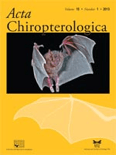
ACTA CHIROPTEROLOGICA
Connecting Research and Conservation for ChiropteraACTA CHIROPTEROLOGICA is a prominent international journal dedicated to the field of bat research, published by the Museum & Institute of Zoology PAS-Polish Academy of Sciences. With its commitment to scholarly excellence, this journal serves as a vital platform for scientists, researchers, and students exploring various aspects of chiropterology, including ecology, behavior, conservation, and taxonomy of bats. The journal has been consistently recognized for its high-quality contributions, holding a commendable Q2 status in the categories of Animal Science and Zoology as of 2023, and ranking #191 out of 490 in Agricultural and Biological Sciences according to Scopus, placing it in the 61st percentile. Although ACTA CHIROPTEROLOGICA does not operate under an open access model, its rigorous peer-review process and focus on innovative research provide invaluable insights and advancements in the understanding of bat biology and conservation. This journal not only bridges the gap between theoretical knowledge and practical applications but also highlights the importance of protecting these key species within our ecosystems. With a history spanning over two decades, from its inception in 1999 to ongoing contributions anticipated through to 2024, ACTA CHIROPTEROLOGICA continues to be an essential reference for anyone invested in the vibrant field of chiropterological research.
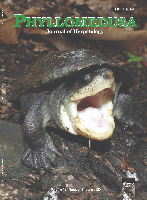
PHYLLOMEDUSA
Fostering scientific dialogue in the realm of zoology.PHYLLOMEDUSA is a distinguished, peer-reviewed journal dedicated to the fields of Animal Science and Zoology and published by UNIV SAO PAULO, ESALQ in Brazil. With an Open Access model in place since 2002, PHYLLOMEDUSA provides a vital platform for the dissemination of research findings, ensuring that quality scholarly articles are freely accessible to a global audience. The journal currently holds a Q3 classification in its category and ranks #375 out of 490 in Scopus, reflecting its commitment to fostering scientific dialogue and advancing knowledge within the community. Covering a diverse range of topics related to amphibian biology, ecology, and conservation, the journal invites contributions from researchers and professionals alike, empowering them to share innovative insights and collaborative studies that address contemporary challenges in zoological sciences. With a converged publishing timeline extending from 2005 to 2024, PHYLLOMEDUSA remains a pivotal resource for academics, students, and practitioners eager to stay abreast of the latest developments in the field.

SPIXIANA
Connecting Research and Conservation in ZoologySPIXIANA is a distinguished journal dedicated to the fields of animal science and zoology, published by VERLAG DR FRIEDRICH PFEIL in Germany. With the ISSN 0341-8391, it has been contributing to the scientific community since its inception, with volumes converging from 2008 to 2024. Although currently listed in the Q4 quartile of the 2023 category rankings for Animal Science and Zoology, it provides a vital platform for researchers and professionals to disseminate significant findings in the field. Despite being unindexed in open access, SPIXIANA ensures that vital research reaches its audience, enhancing academic discourse and furthering our understanding of zoological sciences. Its commitment to sharing rigorous scientific research make it an important resource for anyone passionate about animal biology and conservation.

PACIFIC CONSERVATION BIOLOGY
Elevating conservation discourse with impactful findings.PACIFIC CONSERVATION BIOLOGY is an esteemed academic journal published by CSIRO PUBLISHING, dedicated to advancing research in the fields of ecology and nature conservation. With a strong focus on the unique challenges and biodiversity of the Pacific region, this journal serves as a crucial platform for researchers, conservationists, and students alike to disseminate high-quality, impactful findings. Operating from Australia, it has become a significant resource since its inception in 1993, navigating through nearly three decades of vital scholarly communication. Ranked in the Q2 category for both Ecology and Nature and Landscape Conservation as of 2023, PACIFIC CONSERVATION BIOLOGY maintains rigorous standards, as reflected in its successful Scopus rankings. The journal plays a pivotal role in addressing pressing ecological issues and fostering innovative conservation strategies, making it an essential reference for anyone involved in environmental science. Access options for the journal facilitate widespread distribution of knowledge, supporting the mission to promote informed decision-making in conservation practices.

POPULATION ECOLOGY
Connecting researchers to enhance understanding of ecological processes.Population Ecology is a leading journal dedicated to the advancement of research in the field of ecology, evolution, and behavior, published by the esteemed Wiley in Japan. With an impact factor indicative of its academic significance and ranked Q2 in the 2023 Ecology category, this journal serves as a pivotal resource for researchers, professionals, and students alike, facilitating the dissemination of high-quality research and innovative discussions. Covering diverse aspects of ecological dynamics, population processes, and their evolutionary implications, Population Ecology fosters a deeper understanding of species interactions and environmental factors shaping ecosystems. Available in both print and online formats (E-ISSN 1438-390X), the journal is committed to open access to enhance public engagement and accessibility to crucial scientific findings, ultimately contributing to informed decision-making regarding biodiversity and conservation efforts. With a robust ranking of #235 out of 721 in Agricultural and Biological Sciences, it is poised to remain at the forefront of ecological research through 2024 and beyond.

SALAMANDRA
Exploring the Depths of Herpetological ScienceSALAMANDRA is a distinguished journal published by the Deutsche Gesellschaft Herpetologie und Terrarienkunde e.V., focusing on herpetology and related ecological studies. With an ISSN of 0036-3375, this journal has consistently contributed to the understanding of amphibians and reptiles, solidifying its reputation in the fields of Animal Science and Zoology and Ecology, Evolution, Behavior and Systematics. As of 2023, SALAMANDRA proudly holds a Q2 category ranking in both categories, indicating its significant impact within the academic community, with a Scopus rank of 141 out of 490 in Animal Science and Zoology and 286 out of 721 in Ecology. Although it does not operate under an Open Access model, researchers, professionals, and students can benefit from a wealth of peer-reviewed articles that delve into critical topics, methodologies, and discoveries in herpetological research. Established in 2008, SALAMANDRA continues to serve as an essential platform for the dissemination of knowledge and innovation in herpetology, fostering collaboration and advancement within this vibrant field.
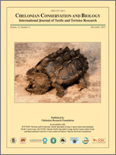
CHELONIAN CONSERVATION AND BIOLOGY
Fostering knowledge for the survival of chelonians.Chelonian Conservation and Biology is a distinguished academic journal dedicated to advancing the field of chelonian research, encompassing conservation, ecology, and biology of turtles and tortoises. Published by Allen Press Inc in the United States, this journal is well-regarded within the realm of Animal Science and Zoology, as well as Ecology, Evolution, Behavior and Systematics, holding a commendable Q3 ranking in both categories for 2023. With an ISSN of 1071-8443 and an E-ISSN of 1943-3956, the journal features a diverse range of articles aimed at professionals, researchers, and students, fostering an understanding of the critical challenges facing chelonians worldwide. Although not an open-access publication, Chelonian Conservation and Biology provides high-quality content, including original research, reviews, and case studies, encouraging engagement and collaboration among experts. With coverage extending from 2006 to 2024, the journal serves as a vital platform for disseminating knowledge and promoting conservation efforts essential to the survival of these remarkable species.